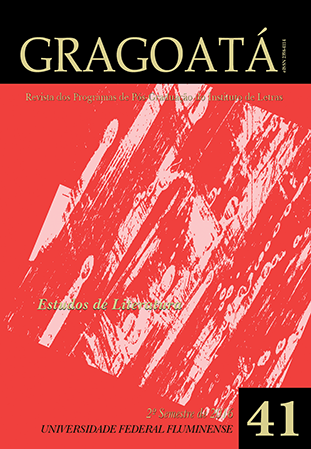Whisperings of writing in Jesusalém
DOI:
https://doi.org/10.22409/gragoata.v21i41.33428Keywords:
Mia Couto, Mozambique’s Novel, body, female, literature and politics.Abstract
The article proceeds from a chapter of our Phd thesis,“Traços do chão, tramas do mundo: representações do político na escrita de Mia Couto e Patrick Chamoiseau” (USP/2014). We propose an analysis on the composition’s strategies of the female characters in the novel Jesusalém (2009) and an analysis of what we perceive is the movement of the committed speech of the writer Mia Couto on female subject. Therefore, it becomes necessary to emphasise the composition of the character Marta which, by writing her notebooks, rewrites her intimacy, her memories, finding in the Mwanito the attention of her first reader, anxious for discovering the first letters of the female body.For developing this approach, we debate the notion of subordinated subject, marked by its female position, elaborated by the indian critique Guayatri Spivak (2010); we propose, then, to highlight gender relations’ topics in the social context of Mozambique, suggested by the Mozambique’s sociology research Conceição Osório (2010); to enhance the autobiographic forms represented in the fiction as it is taught by Philippe Lejeune (2000) and, in this way, to stablish a dialogue with the female voices whispering in the pages of Novas cartas portuguesas (2010), of Maria Isabel Barreno, Maria Teresa Horta and Maria Velho da Costa.Downloads
Downloads
Published
Issue
Section
License
Authors who publish in Gragoatá agree to the following terms:
The authors retain the rights and give the journal the right to the first publication, simultaneously subject to a Creative Commons license CC-BY-NC 4.0, which allows sharing by third parties with due mention to the author and the first publication by Gragoatá.
Authors may enter into additional and separate contractual arrangements for the non-exclusive distribution of the published version of the work (for example, posting it in an institutional repository or publishing it in a book), with recognition of its initial publication in Gragoatá.

Gragoatá is licensed under a Creative Commons - Attribution-NonCommercial 4.0 International.











